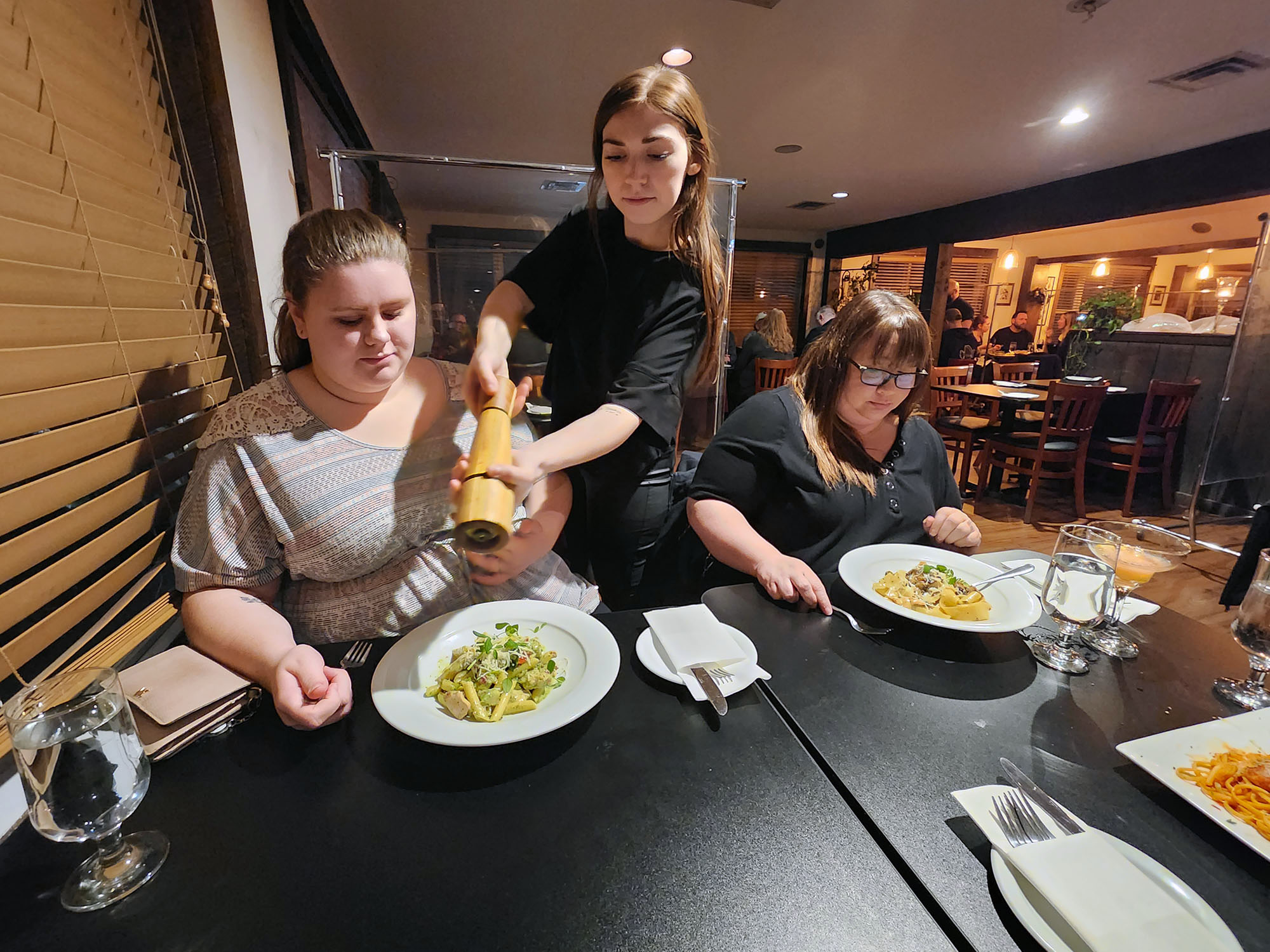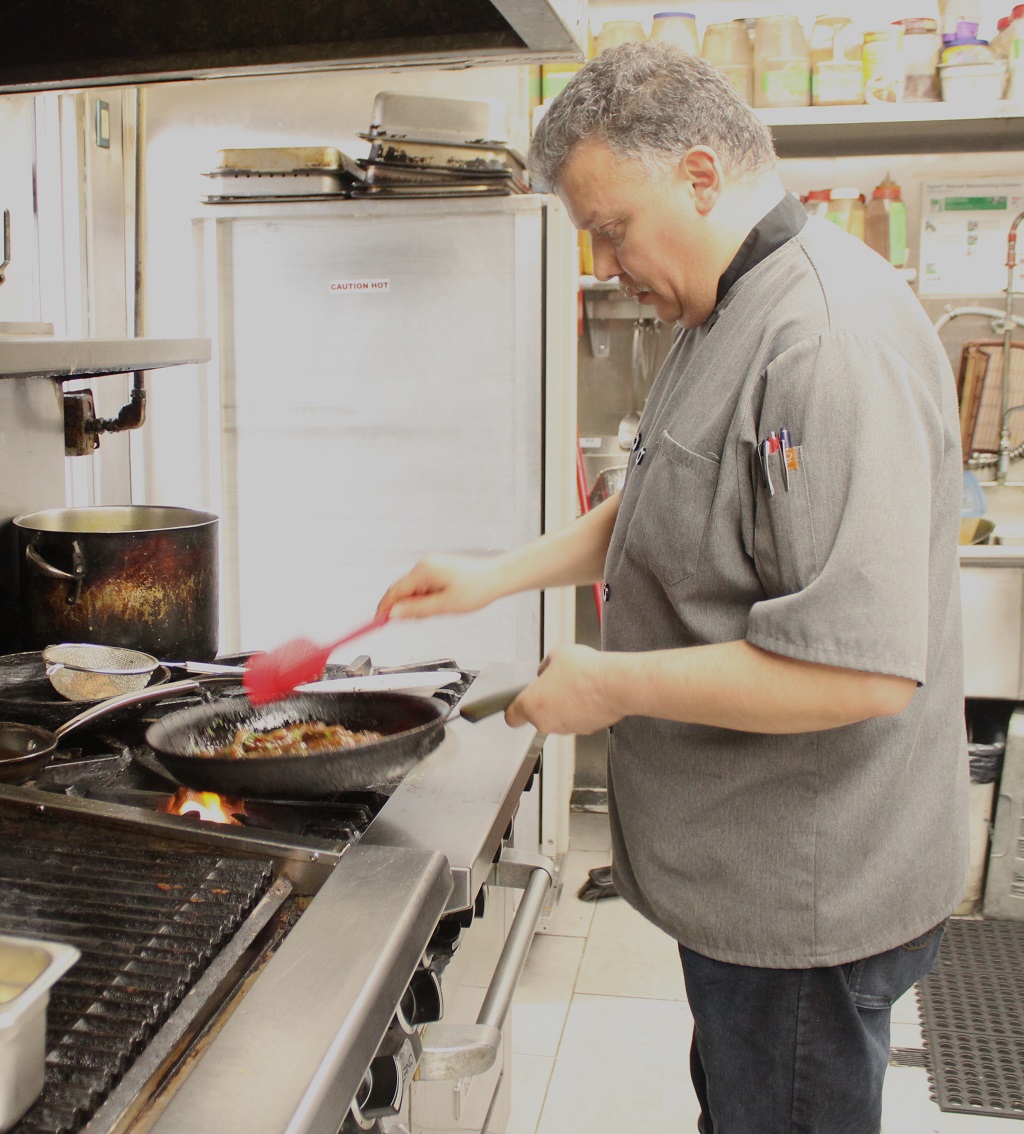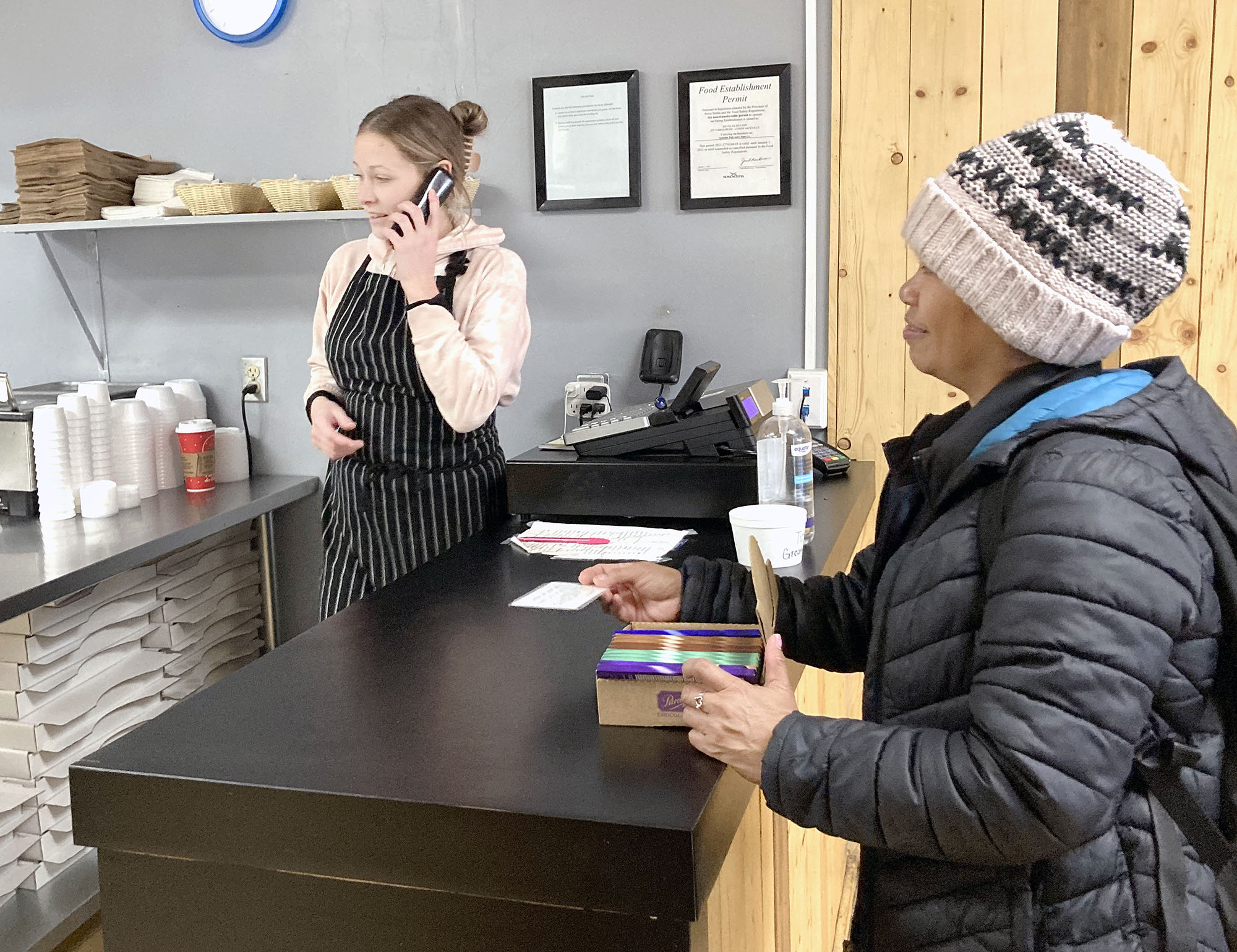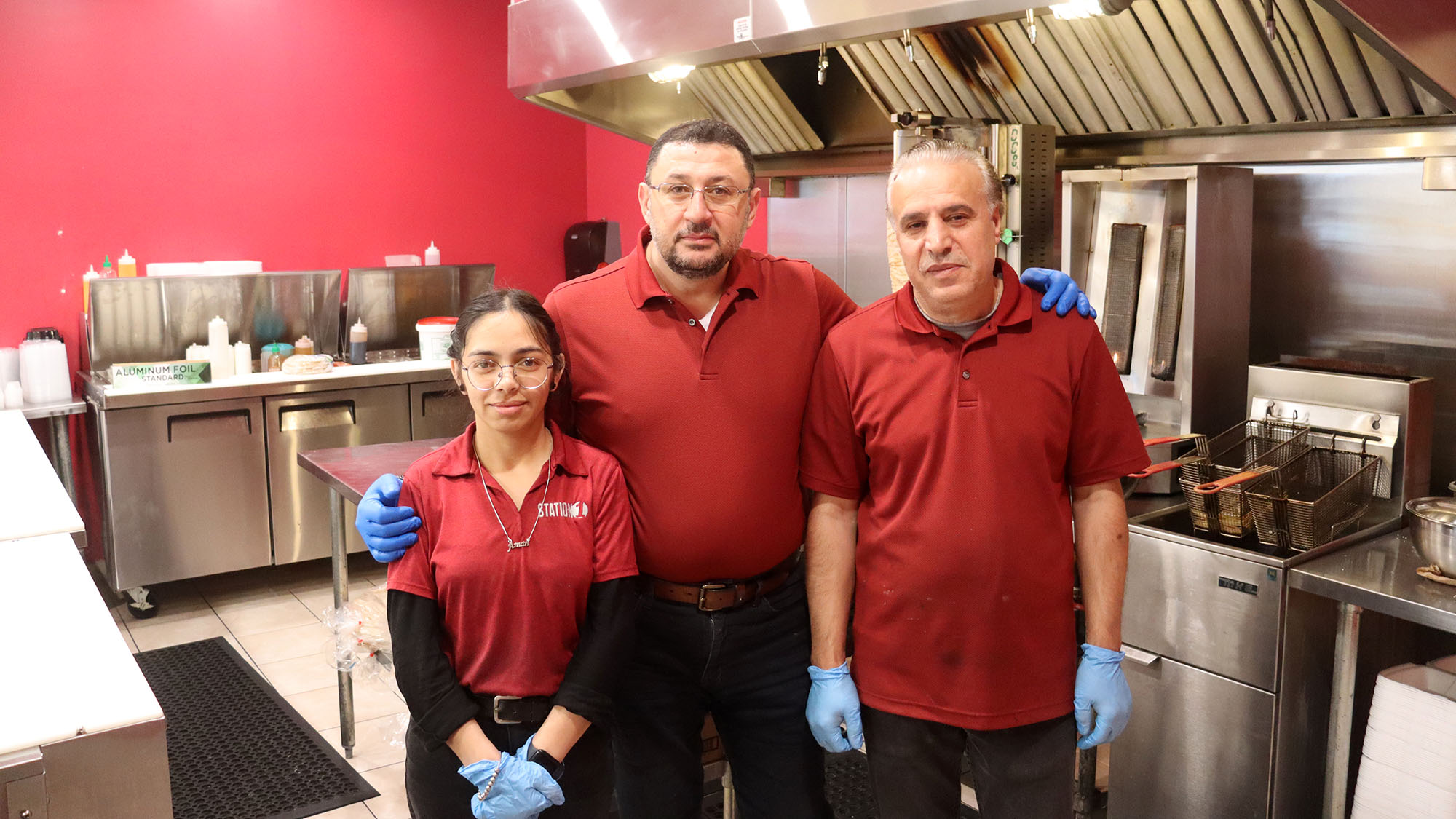Restaurants in recovery: 7 Halifax-area businesses share their stories

caption
Kelsey Stoddard in her element now that the dining room at Vines is open again.COVID-19 restrictions are gone, but owners still struggle with rising costs, labour shortage
Anyone who’s still in the restaurant business after years of COVID-19 restrictions is a born entrepreneur, says the executive director of the Restaurant Association of Nova Scotia.
“Everything costs so much more, and they don’t even have enough to stay open,” Gordon Stewart said in an interview with The Signal.
The Nova Scotia government first closed restaurants on March 15, 2020. By March 19, they were back in business for take-out service only. When dining rooms reopened, restaurants operated under restricted capacity to accommodate social distancing measures. The province lifted restrictions almost exactly two years later, on March 21, 2022.
Stewart said the national average was about five per cent profit in the industry before the pandemic. In Nova Scotia, he said, the average was about four per cent.
“It’s the worst profitability you could possibly imagine,” Stewart said.
Stewart said that sales are returning but profit margins are narrow because of the rising cost of everything from food to labour.
He said restaurant association members are down between 6,000 and 6,500 employees, and many have capitalized on a new federal policy that allows international students to work more than 20 hours a week until the end of 2023.
Stewart said immigration has always been a cornerstone of the industry. One-third of the people opening restaurants in Nova Scotia have lived in the province for less than five years, he said.
“It’s a great outlet for the cultural side of a changing landscape,” he said.
The Nova Scotia Restaurant Association publishes a guide to opening a restaurant in the province. Stewart says it includes a full page of reasons not to get into the restaurant business.
“These are tough people who just keep going,” Stewart said. “Nova Scotia actually added 175 new restaurants during the pandemic.”
Stewart said that restaurants are a $2.2 billion industry in Nova Scotia that spends $80 million on local food and donates $13 million to charity.
The Signal reached out to seven restaurants in the Halifax region to see how they’re faring now.
Chef Abod Cafe & Catering

caption
Chef Abod in the kitchen cooking.Abdul Kader Sadieh, more commonly known as Chef Abod, established his restaurant in 2010 on Kempt Road in the North End of Halifax. When COVID hit, he had to find ways to keep it open.
“My place was doing well during COVID,” Sadieh said. “It’s because I stayed open and didn’t close any day.”
During the peak of the pandemic, when dining in was not allowed, Sadieh moved fully to takeout. He also introduced new services to attract more customers.
“I started making frozen meals because people wanted ready food at home,” he said. “And we had delivery and pick up, so it made it easy for people.”
Sadieh also introduced keto diet meals. Keto was popular during the pandemic, and he wanted to keep bringing more customers by having new options for everyone.
The main problem that the restaurant faced was a staff shortage. Sadieh said he is still struggling to find new staff to fill the spots of employees who quit during COVID.
There were 15 staff members before, and now he has 10. Only two of them lasted with Sadieh through the pandemic. Most of the staff work in the kitchen, and only a few are servers.
Abdulltif Jabi, a member of the kitchen team at Chef Abod, said that he now works an extra three hours every day.
“But we have to work more because the prices of everything is going up,” he said. “A paycheque that was enough before COVID is not enough now.”
The staff shortage led to a change in the restaurant’s hours. It used to be open seven days a week, but now it’s closed on Mondays to give staff a break.
Menu prices also went up. “We don’t have a difficulty getting ingredients, but after COVID, we changed the prices because ingredients are getting more expensive,” Sadieh said.
Sadieh said his revenue did not decrease because he always made sure to keep his business running. When dine-in opened at half capacity, he said he made it up by increasing his catering services.
Despite the pandemic, Sadieh is still seeing his regular customers frequently. He said new customers never stop coming.
By Sondos Elshafei
Sydelles Fish and Chips

caption
Sam Murray serves a customer at Sydelles. Many of the restaurant’s customers are regulars, some dining there every few days.Dave Nicholson’s restaurant, Sydelles Fish and Chips, will mark two years at its Lower Sackville location on Dec. 30.
The business moved to Cobequid Road from Rocky Lake Drive in Bedford, where the old restaurant burnt down in August 2020. Sydelles was in business for 11 years before the fire.
Nicholson, also Sydelles’ head chef, remembers the busy December 2020 opening well.
“It took us almost three weeks [after opening] before we actually were able to stay open a full day,” he said.
About 95 per cent of the orders are takeout orders, Nicholson said, so the number of customers hardly changed during the pandemic.
Employee Sam Murray said the takeout model drew in more support from customers.
“What people were really focusing on was takeout and helping the small guys as compared to big chains,” Murray said.
A small team keeps Sydelles running. Nicholson employs three people, down from nine pre-pandemic. Murray works six days a week, with Nicholson in the kitchen for five.
The restaurant ran seven days a week before the pandemic. Now, it’s closed on Mondays.
Nicholson said there have been other changes. Fewer people have been applying for job openings and items such as fryer oil have jumped in price. Also, supplies are harder to get.
For instance, Sydelles now serves fish and chips in larger dishes than before, as the restaurant can’t get the regular size.
“Before you taste the food, you see the food. So if you’re getting a package that’s only part-full, you think you’re getting [ripped off],” Nicholson said.
Sydelles has operated without the help of food courier services such as Uber Eats. Murray said delivery compromises the food’s freshness.
Nicholson credits his employees and loyal customers for the restaurant’s success. While in the hospital following a surgery earlier this year, he said his employees performed some of his duties and customers sent best wishes.
That support has helped the staff build relationships with his customers.
“You know Ted is coming in at six o’clock for his clams and chips, while his wife wants extra tartar sauce,” Murray said. “Those are just the relationships you build with customers.”
By Luke Dyment
Bluenose II Restaurant & Grill

caption
The owner of the Bluenose II restaurant on Hollis Street says business is good but slower.The Bluenose II Restaurant has been serving Maritime favourites since 1964, and even a viral pandemic could not change its course.
The restaurant, which shares a name with the Lunenburg sailing vessel, has been run by the same family for 58 years. Current owner Leo Gamoulakos took the helm in 2018. He thought it was “a great idea” for the province to shut down in-person dining in March 2020.
“It just gave us the ability to manage the risk of keeping our families and our staff safe,” he said.
That meant not doing takeout orders.
“Money is one thing in our lives, but health is a much bigger component,” Gamoulakos said.
Habib Hussein has worked for Bluenose II for two years. He said adapting to the COVID-19 restrictions was “definitely really hard.”
Hussein is from Bangladesh, and he said he found it difficult keeping up with Nova Scotia’s changing guidelines. But he knows he wasn’t the only one who thought so.
“Not only for me, but I feel like everyone, even our customers, found it really hard to follow all the restrictions,” he said.
On June 5, 2020, the Bluenose II announced on Instagram the diner’s return at 50 per cent capacity with a maximum of five people to a table. Gamoulakos said the support the restaurant got was “wonderful.”
But as the restaurant is in the heart of downtown Halifax, it relied on other downtown businesses. The usual booming summer months were extra challenging, with tourists not travelling to Halifax and the popular Halifax Busker Festival going online.
The restaurant “really supports the business in the downtown area … so without all those factors, our business just wasn’t solid,” said Gamoulakos.
In 2022, the Bluenose II is steadily moving forward but is not at full pre-COVID functionality.
“We’re still good, a little slower than in the past,” Gamoulakos said. “It’s due to the fact that local businesses have not fully come back to work.”
By Jake Webb
Gangnam Restaurant

caption
Namsuk Cho is from Korea and runs the restaurant with her family.On a busy Sunday evening in December, the 10 tables are almost full of customers. From time to time, a delivery person comes in to pick up food.
Gangnam Restaurant is a Korean-style barbecue dining room on Barrington Street. Owner Namsuk Cho said the restaurant, which opened in 2017, struggled to survive the COVID-19 pandemic.
“We decreased our staff members,” said Cho in Korean, as the cashier beside her translated into English. “We don’t need servers for dining in, so just my family worked here.”
When COVID-19 restrictions prevented customers from eating inside restaurants, there were only delivery and pickup orders at Gangnam. The restaurant was open until 8:30 p.m. and closed on Wednesdays.
Since the restrictions were eased in July 2022, the restaurant has extended its business hours from noon to 9:30 p.m. seven days a week.
Cho said business has improved and she’s hired more employees.
Cho said that since many of her ingredients are shipped from Toronto, costs have gone up because of rising transportation and fuel prices. As a result, she has hiked menu prices by five to 10 per cent.
By Cheng Yang
Station 1 Lebanese Kitchen

caption
Khaled Mojarkish (middle) poses for a photo with two of his employees.Station 1 Lebanese Kitchen, like many businesses, faced uncertainty at the start of the pandemic.
The restaurant is in the Tacoma Plaza in Dartmouth, with a total of 12 tables inside. It opened in 2019.
Manager Khaled Mojarkish has been in the restaurant industry since 2013. He says if you are in business long enough you are bound to see changes for better and for worse.
“For years, for centuries, business is going up and down and up and down,” Mojarkish said.
The pandemic forced them to use delivery services and platforms, which meant they had to pay commissions.
“We were paying too much money,” Mojarkish said. “That’s the only business we had at that time.”
He’s happy that Station 1 has been able to serve their customers in person again. He said business is doing well, with a steady stream of customers.
But he’s having a problem getting more staff.
“Honestly, during COVID we had a lot of people who were applying for [jobs] at that time,” Mojarkish said, adding he believes it was due to a lack of other employment options at the height of the pandemic.
Amanpreet Kaur has worked at Station 1 since May 2021. She works six days a week, from opening to closing, and would like to see more people hired soon.
“It’s a lot for me sometimes. I really need someone,” she said.
Kaur said she likes working at Station 1 because it feels like she’s working in her own home.
“I respect them and they respect me and they always treat me like a daughter, which is really good for me because I’m alone here and my family [is] back in India.”
By Decklan Z. Rolle
Vines Pasta Grill

caption
Xhavit Rrafshi had plenty of work in the kitchen at Vines throughout the pandemic.Vines Pasta Grill demonstrated that diners in Dartmouth and Cole Harbour made comfort food an essential service during the pandemic.
Kelsey Stoddard, manager of the Italian restaurant in Westphal, said the dining room is returning to capacity.
“We just hired new staff,” Stoddard said. “We got a lot more customers since the masks came off.”
Vishal Srivastava said he and his partner Jasmeen bought Vines Pasta Grill in 2019 because the restaurant had been a destination for a loyal, local customer base for more than 20 years. They opened a second location, Vines Fusion & Grill in Dartmouth, just prior to the pandemic.
“We managed to stay afloat because of our takeout and because of programs from the government that helped initially,” Srivastava said.
He described months when business almost stopped. He said the subsidies were necessary, but they weren’t enough to cover rising costs.
“Once you crossed a certain threshold for revenue, the subsidies stopped, and you lose money,” Srivastava said.
He said that his business retained its customers, consistency and quality through lockdowns and supply chain issues, but he is struggling with climbing costs and staff shortages.
Srivastava said he understands the need for a higher income in an inflationary economy, but he cannot afford to pay higher wages.
Stoddard said that Vines just finished some hiring. They hope to return to full capacity for the busy holiday season.
“Like everywhere, it’s hard to get staff for both front and back of house,” Stoddard said.
Xhavit Rrafshi is one of the chefs at Vines. He said the thriving takeout business kept him cooking when no one was coming in to eat.
“I worked all the time,” Rrafshi said. “Our customers carried us through the pandemic.”
“We were really fortunate that we still had a decent number of guests come in while the restrictions were up,” Stoddard said.
One couple kept their date night tradition alive with Vines throughout COVID-19.
“When there was a full-on lockdown, we would just order takeout,” Susan Cotie said. She and her partner Lorne have been regular customers at Vines since before the pandemic.
Cotie said other than the partitions between the tables, nothing has changed about the experience at Vines. “I like the feeling of a little community place,” she said. “They care that you’re there.”
By Jeremy Hull
Mary’s African Cuisine

caption
Family powered Mary’s African Cuisine at the height of the pandemic.A Ghanaian entrepreneur, Mary Nkrumah found true meaning in the adage that “family is a life-jacket in the stormy seas of life,” when COVID-19 hit. Her restaurant, Mary’s African Cuisine in downtown Halifax, stayed afloat thanks to the overwhelming support of her family.
“During the heavy pandemic, my staff were loyal but it got to a time where we all know people can’t move around … so in fact, I had to lay some of them off. So I was just dealing with my family, my husband and my children,” Nkrumah said.
Now that restrictions have been lifted, business seems to be returning to normal, she said. Nkrumah credits her loyal customers from diverse backgrounds.
“Our customers who started Day 1 are still coming. We also have newcomers. New people who have moved in, come in,” she said.
Nkrumah explains how the pandemic left its trails on some aspects of her business.
“Before, we used to do it like fine dining a bit. But during the heavy times of the pandemic we had to turn it into a takeout place and afterwards it has become like sit down and takeout as well,” she said. “But we do more takeouts than sit downs.”
Ama Bekoe, Nkrumah’s daughter, has worked with her mother in the kitchen and at the front desk.
“We definitely see a lot more people compared to the pandemic when downtown was a ghost town. The environment is definitely uplifting because we get to meet our customers again and we are able to chat with them,” Bekoe said.
The high cost of living has affected business, as customers buy less, said Nkrumah.
“People are still coming, but before you will see people twice in a week here or thrice, maybe now it’s once in a week,” she said.
One thing working for Mary’s African Cuisine is its access to ingredients. Nkrumah said supply was erratic when she launched her business and again at the peak of the pandemic, but things have stabilized now.
“With the ingredients, when I started the business in Halifax, it was really difficult. But now, we have a lot of African groceries here and I get stuff from them and sometimes Superstore or Walmart. There are also a few things that bring from home in Ghana,” Nkrumah said.
Bekoe is thankful for the generosity of her customers during the pandemic.
“There were no changes in tips as people were still picking up food. People were generous with tips because they felt compassionate for essential workers,” she said.
By William Boateng


B
Bill Murphy
P
Paula Miller
T
Terra Tailleur